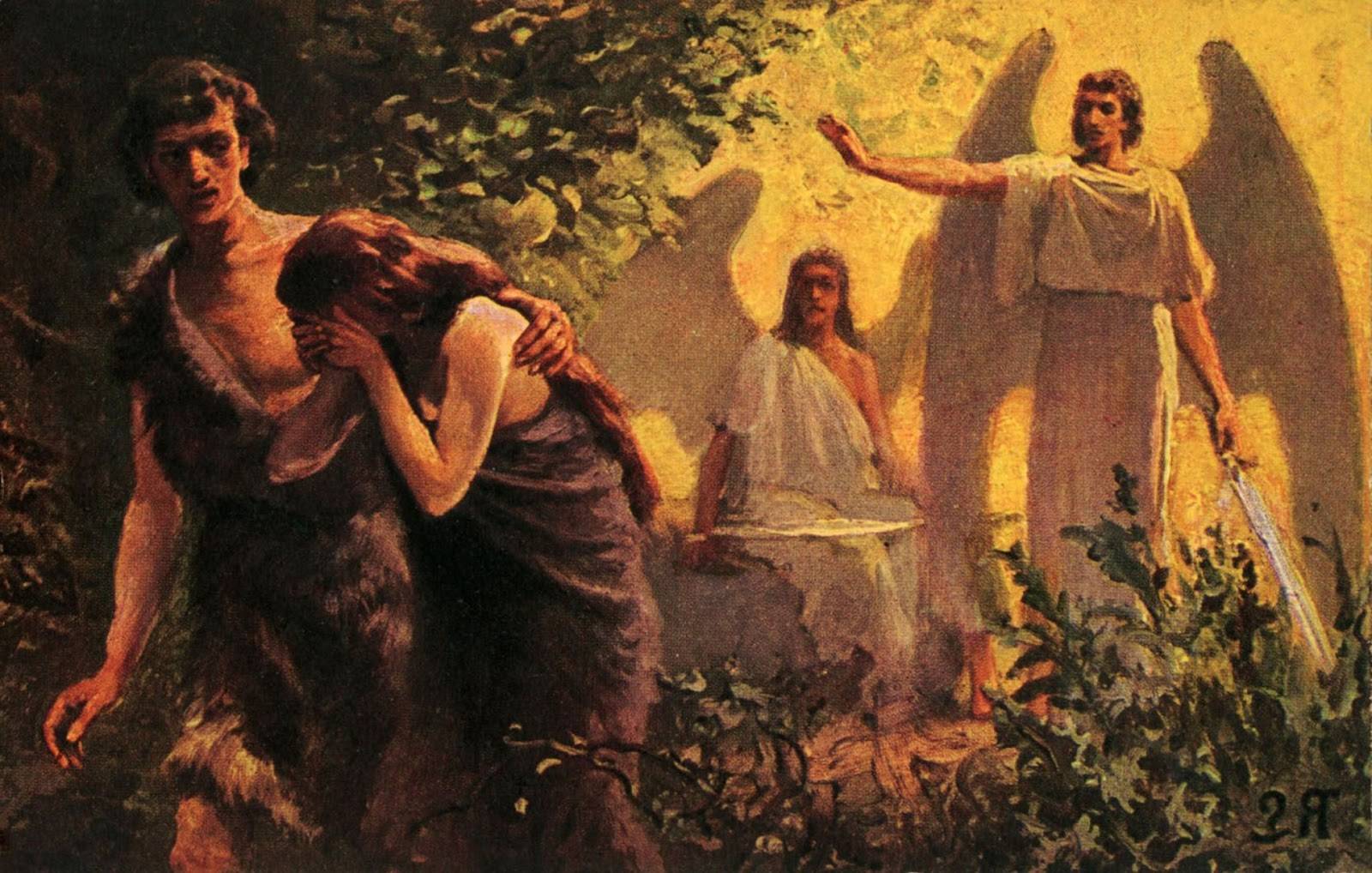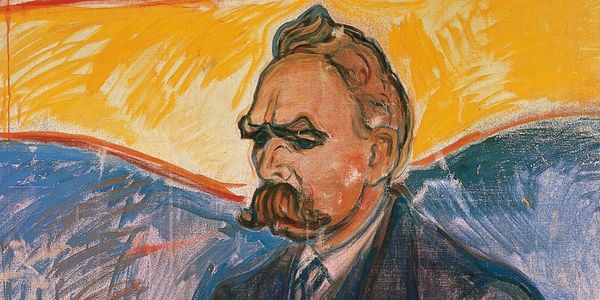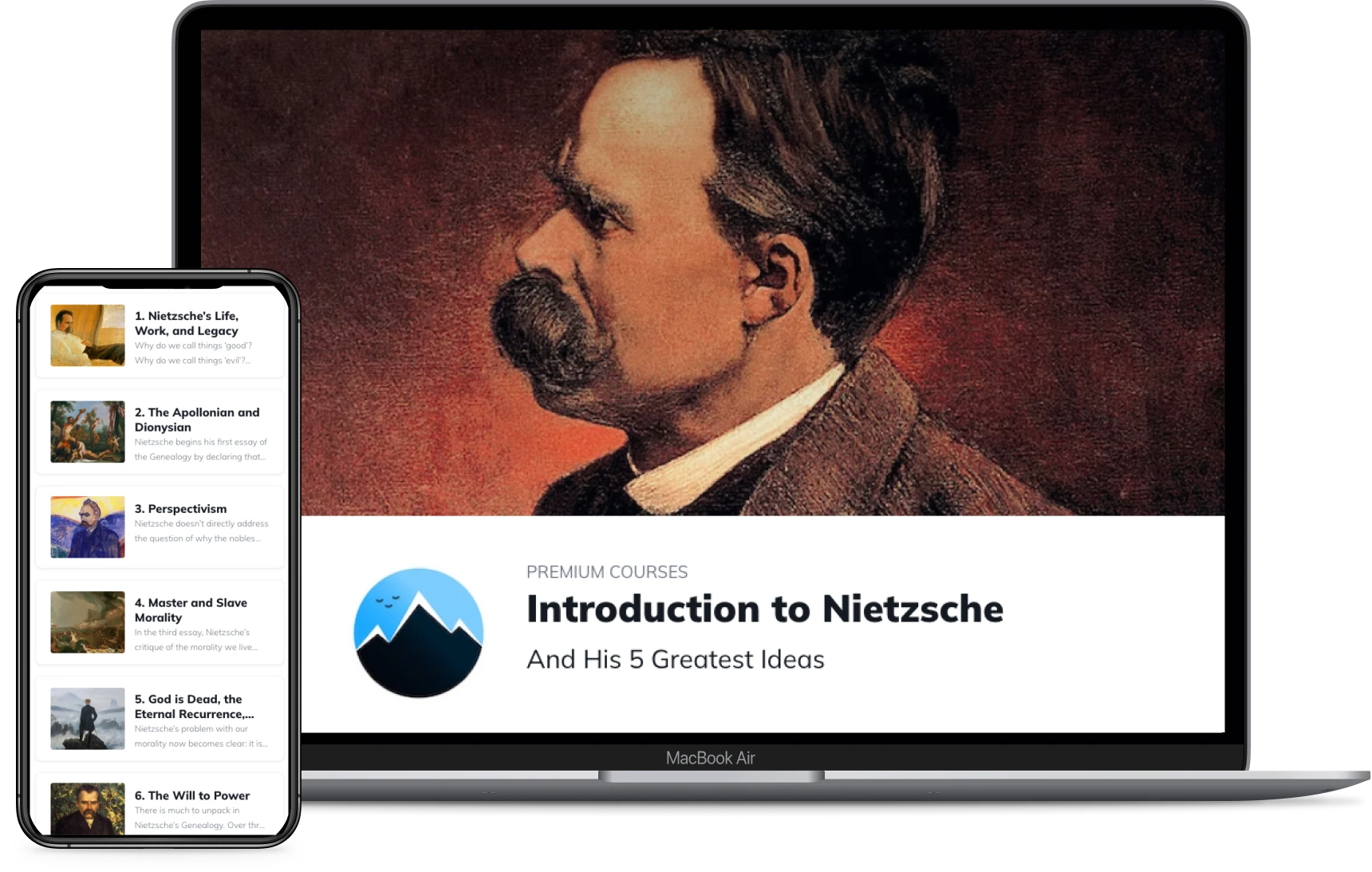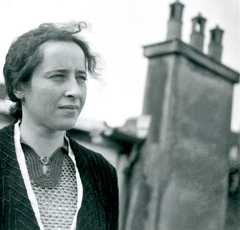
God is Dead: Nietzsche’s Most Famous Statement Explained
German philosopher Friedrich Nietzsche’s famous declaration that God is dead echoed down the 20th century. This article explains what Nietzsche really meant by the oft-misunderstood statement.

“God is dead,” the German philosopher Friedrich Nietzsche famously declares in his 1882 work, The Gay Science: “God remains dead. And we have killed him.”
By these words, Nietzsche does not so much mean that atheism is true — indeed, in the passage from which they’re taken, these words are presented as fresh news to a group of atheists — he more means that, because “the belief in the Christian God has become unbelievable”, everything that “was built upon this faith, propped up by it, grown into it”, including “the whole of our European morality,” is destined for “collapse.”
Nietzsche was writing, of course, in the aftermath of the Enlightenment, a time in which science, mathematics, and philosophy arose across Europe to displace Christianity as the guiding authority on truth about life and the universe. For centuries, Christianity’s teachings about reality — that there exists a Creator outside time and space, and that we should abide by the rules of this Creator to ensure a good afterlife — were entirely dominant.

However, the scientific revolution and the separation of Church and State across Europe pulled the authoritative rug from underneath Christianity’s feet. Atheism became not only acceptable among citizens, but popular.
Without a divine power underpinning our existential situation and moral outlooks, however, our paths into the future became rather uncertain. “How shall we comfort ourselves, the murderers of all murderers?” Nietzsche questions:
Who will wipe this blood off us? What water is there for us to clean ourselves? What festivals of atonement, what sacred games shall we have to invent? Is not the greatness of this deed too great for us? Must we ourselves not become gods simply to appear worthy of it?
In other words: where do we go from here? If God’s authority is no longer unquestionable, how on Earth should we live our lives?
We must face up to the enormity of the death of God
The appropriate response to the age of Enlightenment leading to the death of God, Nietzsche argues, should not be a jeering celebration, nor a shrug of indifference, but a period of deep disorientation and mourning. God was not just an innocuous source of faith and worship, Nietzsche recognizes: God was the indubitable authority that lent power and legitimacy to Judeo-Christian moral values.

From the Buddha to Nietzsche: join 14,000+ subscribers enjoying my free Sunday Breakdown
In one concise email each Sunday, I break down a famous idea from philosophy. You get the distillation straight to your inbox.
💭 One short philosophical email each Sunday. Unsubscribe any time.
While Judeo-Christian moral values aren’t exactly Nietzsche’s preference (he argues in On the Genealogy of Morality, for instance, that Christianity is characterized by an ascetic ideal, the twisted, harmful condemnation of desires we cannot help but have, like those for food and sex) — he sees their sudden removal as dangerous.
Indeed, regardless of its degenerative, life-denying properties (i.e. the valorization of self-denial in the name of ‘virtue’), the Judeo-Christian moral system is at least a mechanism for value creation, Nietzsche says. And this mechanism is so deeply embedded within Western culture — with many of its values like pity, altruism, and compassion regarded as commonsensical or even natural — that coming to terms with its collapse will be painful, psychologically damaging, and extremely difficult.
We thus face a long, daunting task of dismantling our now foundationless values to rebuild them in healthier, life-affirming ways. After all, as Nietzsche puts it (in a typically pithy statement that features in our list of Nietzsche’s cleverest quotes):
God is dead, but given the way of men, there may still be caves for thousands of years in which his shadow will be shown. And we — we still have to vanquish his shadow, too.
Overcoming nihilism
Nietzsche worries that, if we fail to vanquish and decisively replace the shadow of values derived from God, we risk our culture slipping into a deep nihilism.
The death of God means there is no going back: we either find a new mechanism for value creation — a “revaluation of values”, as Nietzsche puts it — or we will eventually descend into a world where, recognizing our values are ultimately foundationless and meaningless, we will become apathetic and cynical — even despairing.

Your Myth-Busting Guide to Nietzsche & His 5 Greatest Ideas
From God is dead to the Übermensch, learn everything you need to know about Friedrich Nietzsche with our concise online guide.
Get Instant Access★★★★★ (50+ reviews for our courses)
As Kierkegaard also suggests when discussing the meaning of life, removing the comfort of God, Judeo-Christian morals, and an afterlife, and having nothing to really replace them with — moving from certainty about what life is for, to uncertainty about what life is for — could lead to an all-pervading numbness or anguish about our lives not mattering in a seemingly pointless universe.
If we are unable to become our own determiners of value (the blueprint for which Nietzsche famously hints at with his character of the ‘Übermensch’ or ‘superman’, as well as his doctrine of the eternal recurrence), then we’ll inevitably respond, Nietzsche laments, by burying our existential angst deep down, and by distracting ourselves with meaningless entertainment.
Nietzsche characterizes this predicament in his 1883-5 work Thus Spoke Zarathustra (which features in our reading list of Nietzsche’s best books), presenting us with a devastating sketch of an apathetic, shallow, distracted humanity:
Behold! I shall show you the Last Man....The earth has become small, and upon it hops the Last Man, who makes everything small... A little poison now and then: that produces pleasant dreams. And a lot of poison at last, for a pleasant death. They still work, for work is entertainment. But they take care the entertainment does not exhaust them... No herdsmen and one herd. Everyone wants the same thing, everyone is the same: whoever thinks otherwise goes voluntarily into the madhouse... ‘We have discovered happiness,’ say the Last Men, and blink.
Perhaps we can recognize aspects of ourselves in Nietzsche’s sketch of the Last Man; perhaps we might think he’s being a little dramatic.
Regardless, his questions stand: if there is no longer an absolute, incontestable authority telling us how to live our lives, then how should we go about living? How can we evolve our values to avoid slipping into meaninglessness and nihilism?
Learn more about Nietzsche
As we discuss in our overview of Nietzsche’s life, insanity, and legacy, Nietzsche has his own fascinating answers to the question of how we can overcome nihilism. These answers are most explicitly embodied in his character of the ‘Übermensch’, commonly translated as the ‘superman’ or ‘overman’ — a picture of what we could be, were we to move beyond good and evil, establish our own naturalized foundations for value, say ‘yes’ to the eternal recurrence, and each fulfill our potential to become who we truly are.
If you’re interested in learning more about Nietzsche, then consider exploring my popular self-paced Introduction to Nietzsche course (join 400+ active members inside).
You might also like the following related reads:
- Friedrich Nietzsche’s Life, Insanity, and Legacy
- Eternal Recurrence: What Did Nietzsche Really Mean?
- Übermensch Explained: the Meaning of Nietzsche’s ‘Superman’
- Nietzsche On Why Suffering is Necessary for Greatness
- Amor Fati: the Stoics’ and Nietzsche’s Different Takes on Loving Fate
- The Apollonian and Dionysian: Nietzsche On Art and the Psyche
- Friedrich Nietzsche: the Best 9 Books to Read
Finally, if you enjoyed this article, you might like my free Sunday breakdown. I distill one piece of wisdom from philosophy each week; you get the summary delivered straight to your email inbox, and are invited to share your view. Consider joining 14,000+ subscribers and signing up below:

From the Buddha to Nietzsche: join 14,000+ subscribers enjoying my free Sunday Breakdown
In one concise email each Sunday, I break down a famous idea from philosophy. You get the distillation straight to your inbox.
💭 One short philosophical email each Sunday. Unsubscribe any time.
About the Author

Get one mind-opening philosophical idea distilled to your inbox every Sunday (free)

From the Buddha to Nietzsche: join 14,000+ subscribers enjoying a nugget of profundity from the great philosophers every Sunday:
★★★★★ (50+ reviews for Philosophy Break). Unsubscribe any time.

Take Another Break
Each break takes only a few minutes to read, and is crafted to expand your mind and spark your philosophical curiosity.





